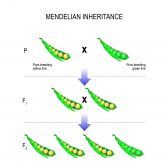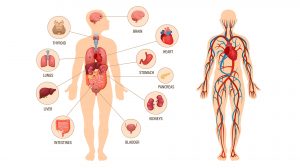Definition
noun
A segmentation gene whose expression subdivides the embryo into a series of stripes, and sets the boundaries of the parasegments. It also regulates the subsequent expression of segment polarity genes.
Supplement
These genes are sequentially expressed next to the gap genes and before the segment polarity genes. In fact, the gene products of gap genes, together with those of maternal genes, activate pair-rule genes.
Examples of pair-rule genes are: even-skipped, hairy, runt, fushi-tarazu, odd-skipped, paired, odd-paired, sloppy-paired, and Tenascin major. Defect in any of these genes results in missing pattern elements in alternate segments. For instance, defective even-skipped gene results in even-numbered parasegments missing in the body pattern of the Drosophila larva.
See also: gap gene, parasegment, segmentation gene.
Dictionary > Pair-rule gene
You will also like...

Inheritance and Probability
Gregor Mendel, an Austrian monk, is most famous in this field for his study of the phenotype of pea plants, including ..

The Dinosaurs
Dinosaurs represented a major turn in the evolutionary development of organisms on Earth. The first dinosaurs were presu..

Plant Meristems and Growth
In plants, growth occurs in meristems, which are the site of repeated cell division of unspecialized cells. These cells ..

Passive and Active Types of Immunity
Lymphocytes are a type of white blood cell capable of producing a specific immune response to unique antigens. In thi..

The Human Physiology
Physiology is the study of how living organisms function. Thus, human physiology deals specifically with the physiologic..

Homeostasis of Organism Water Regulation
Osmoregulation is the regulation of water concentrations in the bloodstream, effectively controlling the amount of water..

